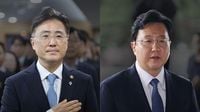South Korea's prosecutorial system is once again under intense scrutiny following revelations of alleged misuse of special activity expenses, known locally as 특수활동비 (special activity funds). These funds, intended for confidential investigations and critical criminal intelligence gathering, have become a focal point of controversy amid ongoing efforts for prosecutorial reform.
On July 4, 2025, the National Assembly passed a supplementary budget bill that controversially included 40.4 million won allocated for prosecutors' special activity expenses. This decision has sparked public debate because it appears to contradict the ruling party's own prosecutorial reform agenda, which aims to strip prosecutors of their direct investigative powers, effectively eliminating the need for such secretive funds.
The Democratic Party (더불어민주당), which spearheads the reform efforts, attached a condition that these funds would only be executed after the reform legislation is enforced. Still, critics argue that reviving these funds undermines the reform's intent and raises questions about the party's genuine commitment. The amount approved is roughly half of the 80 million won requested by the Yoon Seok-yeol administration last year.
Historically, special activity expenses have been criticized as a "lifeline of prosecutorial power" and a "slush fund for the Prosecutor General," as was underscored when the Democratic Party fully cut these funds on December 10, 2024. This move came after a joint investigative report by civic groups and progressive media, known as the Prosecutorial Budget Verification Joint Reporting Team, exposed troubling patterns of misuse.
According to their findings, former Prosecutor General Yoon Seok-yeol allegedly used special activity funds for retaliatory investigations against the previous Moon Jae-in administration, particularly targeting the administration's flagship "denuclearization" policy. During November and December 2020, the Daejeon District Prosecutors' Office, which conducted this investigation, spent three to four times more on these funds compared to the same period the previous year. Notably, in December 2020 alone, the office spent 49.02 million won—the highest monthly expenditure in its history.
Further scrutiny revealed that the prosecution failed to provide proper accounting for these expenses. Card statements submitted following a court-ordered information disclosure were blurred or had critical details like merchant names and transaction times obscured. When questioned in the National Assembly, then-Minister of Justice Han Dong-hoon infamously responded that "the ink evaporated," drawing public ire due to the implausibility of such an explanation.
Moreover, civic groups cross-checked the submitted receipts and found that special activity funds were used for purposes far removed from secret investigations: meal expenses, holiday gift cakes, incentive payments, and even rental fees for air purifiers and mobile phone bills. Despite these revelations, the prosecution has maintained that the funds were used appropriately and has failed to propose any concrete reforms.
Adding fuel to the fire, a recent investigative report by Newstapa has unveiled further allegations of misuse by two high-ranking officials appointed by the current Lee Jae-myung government: Lee Jin-soo, Deputy Minister of Justice, and Jung Jin-woo, Seoul Central District Prosecutor.
Special activity expenses are meant to be used irregularly, reflecting the unpredictable nature of criminal investigations, such as tracking drug trafficking or organized crime. However, Newstapa's investigation identified four patterns indicative of misuse: spending large sums just before major holidays (holiday gift suspicions), regularly disbursing fixed amounts (regular spending), and concentrated year-end spending to zero out leftover funds (year-end spending to zero out unused funds or remaining funds).
Lee Jin-soo, who served as head of the Busan Eastern District Prosecutors' Office from July 2022 to September 2023 before becoming Deputy Minister of Justice, was found to have distributed fixed cash amounts—500,000 won and 530,000 won—to someone on the same day every month for four consecutive months. This pattern suggests these funds were used more like monthly salaries to subordinates rather than for special activities.
Additionally, on December 21, 2022, Lee spent 5,170 won in special activity funds, unusually broken down to the 10-won unit, raising suspicions that he was deliberately spending every last bit to ensure the year's unused funds reported to the National Assembly were zero. This practice aligns with a broader pattern where the prosecution annually reports zero unused special activity funds.
Similarly, Jung Jin-woo, now Seoul Central District Prosecutor and formerly head of the Jinju Branch of the Changwon District Prosecutors' Office, exhibited comparable patterns. From August 2019 to January 2020, he allegedly distributed fixed cash amounts of 100,000 won and 200,000 won monthly on the same day, again suggesting regular disbursement unrelated to actual special investigations.
Notably, on December 26, 2019, Jung spent 1.09 million won in special activity funds in a single day—three times the daily average expenditure during his tenure. That month, he spent a total of 6.19 million won, which was between two and fifteen times more than other months, indicating possible year-end spending to exhaust the budget.
Such concentrated year-end spending raises questions about budget management and the true purpose of these funds, suggesting they were used to ensure no money remained unspent rather than for genuine investigative needs.
Both officials have not responded to requests for comment from Newstapa regarding these allegations.
The ongoing revelations have deepened public skepticism about the prosecutorial reform's sincerity and effectiveness. While the government pushes for legislative changes to limit prosecutorial powers, the simultaneous revival and questionable use of special activity funds seem contradictory and undermine efforts to restore public trust.
Prosecutorial reform in South Korea has long been a contentious issue, with critics arguing that unchecked prosecutorial powers have led to abuses and politicization of investigations. The special activity funds, shrouded in secrecy and lacking transparent oversight, have been emblematic of these concerns.
As the debate continues, many citizens and watchdog groups are calling for greater transparency, stricter controls, and independent audits of prosecutorial budgets to prevent misuse and ensure that funds are used solely for legitimate investigative purposes.
Without such measures, the cycle of controversy and mistrust is likely to persist, hindering meaningful reform and eroding confidence in the justice system.

